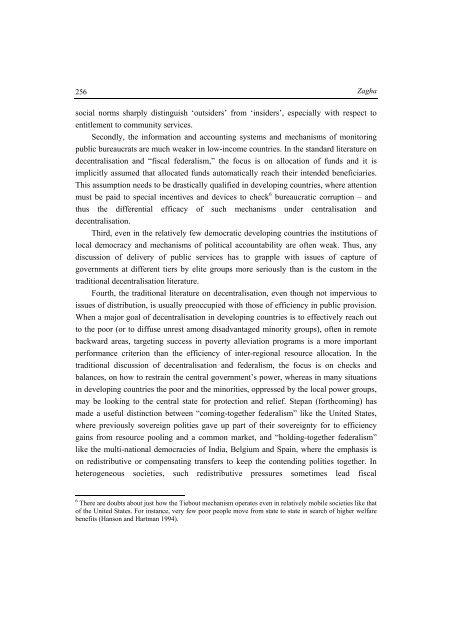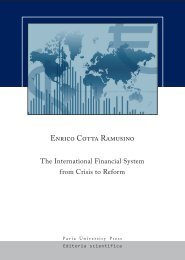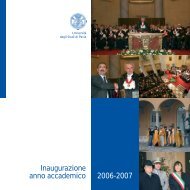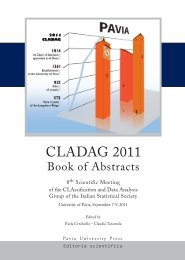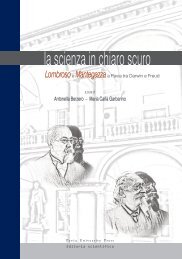The Palestinian Economy. Theoretical and Practical Challenges
The Palestinian Economy. Theoretical and Practical Challenges
The Palestinian Economy. Theoretical and Practical Challenges
Create successful ePaper yourself
Turn your PDF publications into a flip-book with our unique Google optimized e-Paper software.
256<br />
Zagha<br />
social norms sharply distinguish ‘outsiders’ from ‘insiders’, especially with respect to<br />
entitlement to community services.<br />
Secondly, the information <strong>and</strong> accounting systems <strong>and</strong> mechanisms of monitoring<br />
public bureaucrats are much weaker in low-income countries. In the st<strong>and</strong>ard literature on<br />
decentralisation <strong>and</strong> “fiscal federalism,” the focus is on allocation of funds <strong>and</strong> it is<br />
implicitly assumed that allocated funds automatically reach their intended beneficiaries.<br />
This assumption needs to be drastically qualified in developing countries, where attention<br />
must be paid to special incentives <strong>and</strong> devices to check 6 bureaucratic corruption – <strong>and</strong><br />
thus the differential efficacy of such mechanisms under centralisation <strong>and</strong><br />
decentralisation.<br />
Third, even in the relatively few democratic developing countries the institutions of<br />
local democracy <strong>and</strong> mechanisms of political accountability are often weak. Thus, any<br />
discussion of delivery of public services has to grapple with issues of capture of<br />
governments at different tiers by elite groups more seriously than is the custom in the<br />
traditional decentralisation literature.<br />
Fourth, the traditional literature on decentralisation, even though not impervious to<br />
issues of distribution, is usually preoccupied with those of efficiency in public provision.<br />
When a major goal of decentralisation in developing countries is to effectively reach out<br />
to the poor (or to diffuse unrest among disadvantaged minority groups), often in remote<br />
backward areas, targeting success in poverty alleviation programs is a more important<br />
performance criterion than the efficiency of inter-regional resource allocation. In the<br />
traditional discussion of decentralisation <strong>and</strong> federalism, the focus is on checks <strong>and</strong><br />
balances, on how to restrain the central government’s power, whereas in many situations<br />
in developing countries the poor <strong>and</strong> the minorities, oppressed by the local power groups,<br />
may be looking to the central state for protection <strong>and</strong> relief. Stepan (forthcoming) has<br />
made a useful distinction between “coming-together federalism” like the United States,<br />
where previously sovereign polities gave up part of their sovereignty for to efficiency<br />
gains from resource pooling <strong>and</strong> a common market, <strong>and</strong> “holding-together federalism”<br />
like the multi-national democracies of India, Belgium <strong>and</strong> Spain, where the emphasis is<br />
on redistributive or compensating transfers to keep the contending polities together. In<br />
heterogeneous societies, such redistributive pressures sometimes lead fiscal<br />
6 <strong>The</strong>re are doubts about just how the Tiebout mechanism operates even in relatively mobile societies like that<br />
of the United States. For instance, very few poor people move from state to state in search of higher welfare<br />
benefits (Hanson <strong>and</strong> Hartman 1994).


